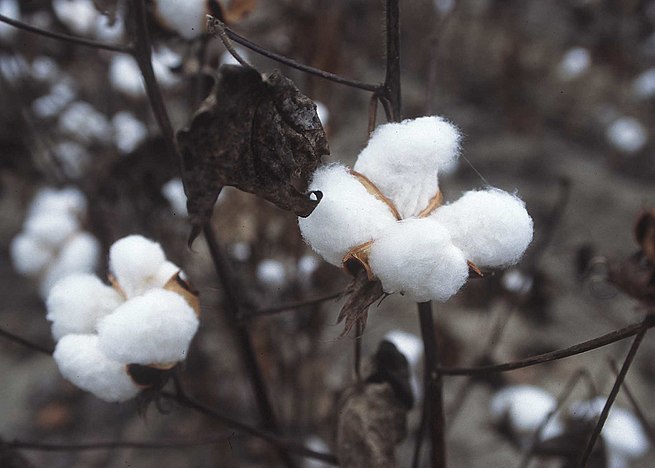
Main Difference
The main difference between Cotton and Terylene is that the Cotton is a plant fiber from the genus Gossypium and Terylene is a polymer.
-
Cotton
Cotton is a soft, fluffy staple fiber that grows in a boll, or protective case, around the seeds of the cotton plants of the genus Gossypium in the mallow family Malvaceae. The fiber is almost pure cellulose. Under natural conditions, the cotton bolls will increase the dispersal of the seeds.
The plant is a shrub native to tropical and subtropical regions around the world, including the Americas, Africa, and India. The greatest diversity of wild cotton species is found in Mexico, followed by Australia and Africa. Cotton was independently domesticated in the Old and New Worlds.
The fiber is most often spun into yarn or thread and used to make a soft, breathable textile. The use of cotton for fabric is known to date to prehistoric times; fragments of cotton fabric dated from 5000 BC have been excavated in Mexico and between 6000 BC and 5000 BC in the Indus Valley Civilization. Although cultivated since antiquity, it was the invention of the cotton gin that lowered the cost of production that led to its widespread use, and it is the most widely used natural fiber cloth in clothing today.
Current estimates for world production are about 25 million tonnes or 110 million bales annually, accounting for 2.5% of the world’s arable land. China is the world’s largest producer of cotton, but most of this is used domestically. The United States has been the largest exporter for many years. In the United States, cotton is usually measured in bales, which measure approximately 0.48 cubic meters (17 cubic feet) and weigh 226.8 kilograms (500 pounds).
-
Terylene
Polyethylene terephthalate (sometimes written poly(ethylene terephthalate)), commonly abbreviated PET, PETE, or the obsolete PETP or PET-P, is the most common thermoplastic polymer resin of the polyester family and is used in fibres for clothing, containers for liquids and foods, thermoforming for manufacturing, and in combination with glass fibre for engineering resins.
It may also be referred to by the brand names Terylene in the UK, Lavsan in Russia and the former Soviet Union, and Dacron in the US.
The majority of the world’s PET production is for synthetic fibres (in excess of 60%), with bottle production accounting for about 30% of global demand. In the context of textile applications, PET is referred to by its common name, polyester, whereas the acronym PET is generally used in relation to packaging. Polyester makes up about 18% of world polymer production and is the fourth-most-produced polymer; polyethylene (PE), polypropylene (PP) and polyvinyl chloride (PVC) are first, second and third, respectively.
PET consists of polymerized units of the monomer ethylene terephthalate, with repeating (C10H8O4) units. PET is commonly recycled, and has the number “1” as its resin identification code (RIC).
Depending on its processing and thermal history, polyethylene terephthalate may exist both as an amorphous (transparent) and as a semi-crystalline polymer. The semicrystalline material might appear transparent (particle size less than 500 nm) or opaque and white (particle size up to a few micrometers) depending on its crystal structure and particle size.
The monomer bis(2-hydroxyethyl) terephthalate can be synthesized by the esterification reaction between terephthalic acid and ethylene glycol with water as a byproduct, or by transesterification reaction between ethylene glycol and dimethyl terephthalate (DMT) with methanol as a byproduct. Polymerization is through a polycondensation reaction of the monomers (done immediately after esterification/transesterification) with water as the byproduct.
-
Cotton (noun)
A plant that encases its seed in a thin fiber that is harvested and used as a fabric or cloth.
-
Cotton (noun)
Gossypium, a genus of plant used as a source of cotton fiber.
-
Cotton (noun)
The textile made from the fiber harvested from the cotton plant.
-
Cotton (noun)
An item of clothing made from cotton.
-
Cotton (adjective)
Made of cotton.
-
Cotton (verb)
To get on with someone or something; to have a good relationship with someone.
-
Terylene (noun)
A polymer, polyethylene terephthalate (PET), used for making thread and cloth.
-
Terylene (noun)
an artificial textile fibre made from a polyester, used to make light, crease-resistant clothing, bed linen, and sails.
